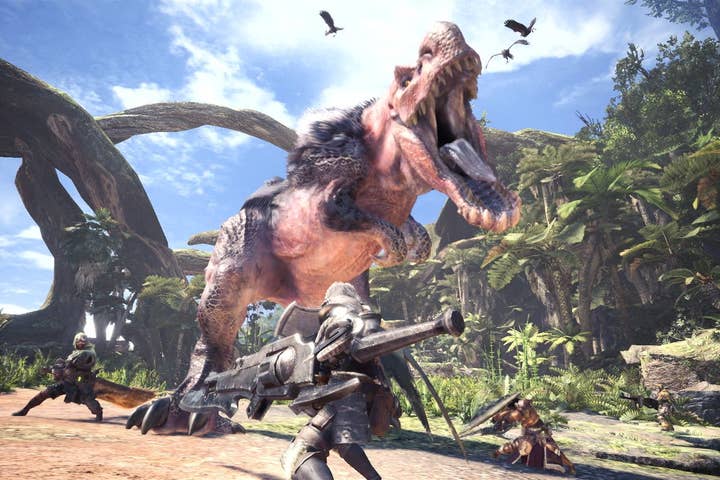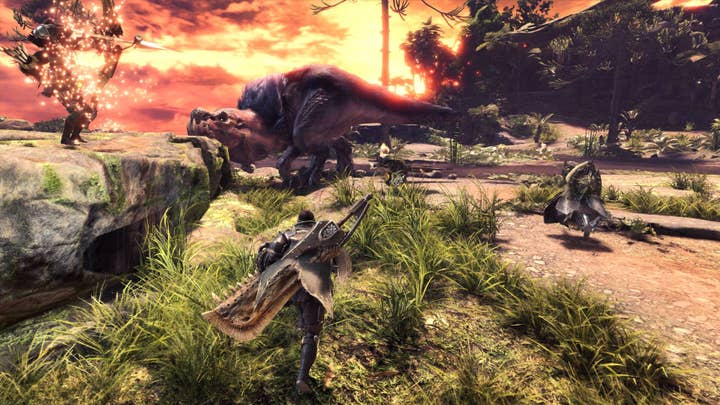Monster Hunter World: Critical Consensus
Capcom's franchise brings more than a decade of Nintendo exclusivity to an end in fine style
The last time someone without a Nintendo console was able to play the latest Monster Hunter, the world was a very different place. Facebook had only just opened to the general public, the iPhone didn't exist, and the Nintendo Wii was just getting ready to launch in Japan.
Indeed, after two successful games on PlayStation 2 and PSP, Monster Hunter's passionate fanbase would only be able to play the next three iterations on the Wii or, more importantly, the 3DS. Both systems had large enough audiences to make Capcom's franchise a big success, particularly in Japan, but what each game could realistically be was inherently tied to Nintendo's tendency to stay a few steps behind the cutting-edge of hardware.
For those who pondered what Capcom could achieve with a bleeding-edge console, Monster Hunter World is the emphatic response - not only the series' return to PlayStation after an absence of 12 years, but also its debut on an Xbox system of any kind. For a series with a reputation based on intricate design, the leap to the visual splendour afforded by a console like the PS4 Pro has been a prospect to savour.
"Visually, this is an artistic team at the top of its game, set free by more powerful hardware"
The Daily Telegraph
With dozens of reviews now published, it's clear that Capcom has delivered not just the series' most technically advanced game, but also one of its very best. According to The Daily Telegraph, which awarded Monster Hunter World top marks, the key to its achievement is that the extra horsepower and visual lustre don't simply dazzle, but reinforce and expand on the series' core strengths.
"World's myriad areas are stunningly realised and wildly diverse," The Telegraph said, noting (as many critics have) a welcome lack of loading screens. "Visually, this is an artistic team at the top of its game, set free by more powerful hardware.
"Monster Hunter has traditionally been a series built for handheld, with all the restrictions that entails. But restriction can often breed invention, so to see that expertly combined with the technology of the latest home consoles is as gorgeous and arresting as you could hope for. The Coral Highlands, in particular, is a work of fantastical brilliance; transporting the vivid colours and textural diversity of the deep sea to a sprawling, vertiginous cliffside.

"It isn't just for show either, the soft, blue webbing that weaves itself between coral rocks is bouncy and pliable. If you are standing on that when the rat-faced Paolumu slams into it, then you're going flying. Or maybe you can trick it into getting its head jammed in the centre for a few free whacks... Learning and utilising each terrain becomes a key part of combat, adapting to your surrounding as much as to the particular monster you are fighting."
After so long on Nintendo platforms and all that entails, the switch to more powerful hardware is a focus for the vast majority of reviews, and is roundly praised in each and every one. The positive sentiment around Monster Hunter World is such that even an 8 out of 10 amounts to something like dissent, and even then the most frequent criticism is that Monster Hunter World is too much its own beast, dragging more than a decade of quirks and received knowledge to platforms populated by gamers who may never have encountered the series before.
"Capcom is still yet to get the tutorial and general learning curve right"
Push Square
This is the concern for Push Square, a PlayStation website that nevertheless echoes virtually every point of praise voiced in reviews with higher scores. For all the progress made in Monster Hunter World, it said, the series' old habits die hard.
"Capcom is still yet to get the tutorial and general learning curve right, and that's probably the most crucial issue here. It's likely that this will be many's first Monster Hunter, and you're basically just shoved into the deep end following a [sic] all-too-brief tutorial.
"In fact, it's very feasible that even 20 hours into the experience, entire systems will still elude you. You'll have moments when a non-playable character asks you to do something and you won't even know where to start. Part of the fun here is in figuring everything out, sure, but good luck trying to capture a monster without assistance.
"If you haven't played a Monster Hunter before, you'll need a hefty beginner's guide to get you up to speed. There's just so many systems to learn that it feels overwhelming at first. You can learn most of them on the go, and that's a huge part of the charm, but there are some that could really have done with a tutorial."

The root of this complaint surfaces in many reviews, but in very different ways. Virtually every single critic acknowledges that Monster Hunter World doesn't explain all of its systems, and that it carries a little of the baggage accumulated over years of catering to a fiercely loyal, fully engaged audience. For the majority, though, what Capcom has done here still represents progress, and progress that does not compromise on the very simple, utterly addictive loop at the series' core.
For Eurogamer, which hands out a rare "Essential" review, the process of hunting down a monster and using its carcass to craft better equipment to tackle the next is, "one of the most compelling loops you'll come across in gaming." First and foremost, Monster Hunter World does not get in the way of the series fundamental appeal, and it does so while making "profound" differences to the user experience.
"Almost all of the changes are for the better, and almost none of them compromise the magic"
The Verge
"At its very core this is the very same Monster Hunter, and in many ways it's a more streamlined affair than we've become used to in recent years," Eurogamer said. "After the dizzyingly broad variety box that was Monster Hunter Generations - itself a compilation of sorts that brought the fourth generation of Monster Hunter to an end - it's even a relatively slight offering. Gone are the Hunter Arts, and there are no new weapons added to the 14-strong roster. In Monster Hunter World, the very kernel of the series goes largely untouched.
"Which is well enough, really, given how wonderful that kernel is, and Monster Hunter World at least makes an effort to open it up to all. To say it's accessible might be a slight overstatement - it's quicker to get new players into the thick of the action, though it's still just as quick to knock them back on their arses a few hours later and several key systems remain unexplained throughout - so perhaps it's best to say it's undergone a fair amount of modernisation, and now lags only slightly behind its contemporaries."
In Monster Hunter, then, ideas like progress and accessibility are relative terms, and relative principally to its own past rather than any old franchise grasping at a few million extra sales. Like Dark Souls, finding your way into the experience is at the root of why people play it at all. And for the initiated, what seems inscrutable to a new player represents myriad small but significant changes to an already winning formula.
"Far from dumbing Monster Hunter down for a mainstream global audience, Capcom has shown remarkable confidence and self-awareness in designing World," said The Verge in its glowing review. "Almost all of the changes are for the better, and almost none of them compromise the magic... A slight but reasonably engaging story now serves as connective tissue for the quest structure. That structure has been reorganized so there's no separation between single-player and multiplayer quests, and it's always clear what you need to do next to progress.
"Sensible, practical tweaks abound. There's a new system that helps you find the target monster by searching for tracks, rather than hoping you randomly bump into it. There are options for more Western-style control schemes - for example, you can select items through a radial menu, or click in the left analog stick to sprint. The item crafting system is streamlined to the point of almost being automatic. Drinking health potions no longer requires you to stand in place and hold a celebratory pose for an agonizingly long amount of time, opening you up to an attack.
"I can't tell you whether you'll love Monster Hunter World, nor whether it'll be enough for Monster Hunter to finally take off in the West. The series is never going to be for everyone... What I can say, though, is that you owe it to yourself to give Monster Hunter World a shot."
